At Ninchanese, we aim to teach you both at the same time, so today, we’re showing you some really funny and popular Chinese catchphrases. They’re really handy if you want to chat online or talk to your Chinese-speaking friends. And they are great to learn, because they always reflect current issues and help you understand Chinese culture better . Besides, it’s not as easy for us, foreign learners to know these things if we aren’t living in China.
One day, you suddenly start seeing a new word or an expression pop up everywhere online or hear teenagers use it all the time and you don’t even know what it means yet. Chances are, you’ve encountered a catchphrase; a popular slang word or expression that everyone starts suddenly using to talk about a concept.
In China, new slang and catchphrases emerge at break-neck speed and become immediately immensely popular on Weibo and other online forums. So if you want to speak really modern Chinese, being familiar with Chinese catchphrases as well as the things you learn in class will help you a lot.
Nincha’s here to help though so don’t be worried, you’ll know all you need to know! Here we go!
🏮 Ninchanese is an incredible app for learning Chinese! 🏮
” I actually graduated from the University of Edinburgh with a MA in Chinese.
I’ve used Ninchanese daily, and it has helped me a lot! “
– Connor, Ninchanese User
Try Ninchanese, an award-winning method to learn Chinese today:
Start Learning Now
Chinese catchphrase #1 : It’s a Duang thing
“DUANG”
duāng
“boing,” “ta-da!”
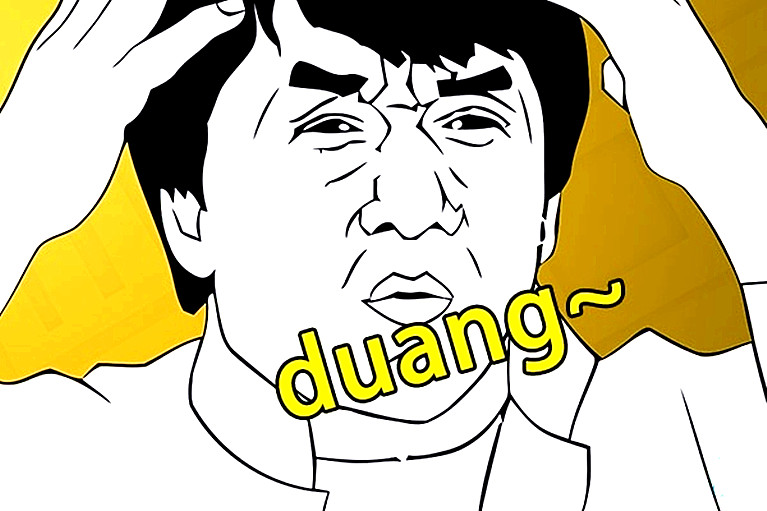
Our first must-know Chinese catchword is a word you’ve probably come across already, and not necessarily in a Chinese text. It was a big hit not only in China but also in some parts of the world (hello 9gag): DUANG.
Duang, this strange little word (pronounced: dwong) suddenly hit the Chinese Internet by storm and became viral throughout China. You can now hear people use it jokingly in the streets, on TV shows, everywhere!
This word doesn’t actually have a meaning, it is a modal word like “Oops”, “ta-da” or “boing!”, a mimetic word to show your excitement or to describe something that happens all of a sudden. A majority of Chinese netizens also seem to use it as an adjective before another word to emphasize it.
For instance,
他 duang 的一下摔倒了。
tā duāng de yī xià shuāi dǎo le.
“Duang”, he fell down all of a sudden.
DUANG first appeared in a Jackie Chan interview. In the interview, to show how he felt about a shampoo advertisement, he used this word to explain how magical the shampoo could be. Just like magic, after DUANG a second your hair turns black again.
Now, if you google Duang, in addition to Jackie Chan’s face, you’ll see this everywhere:
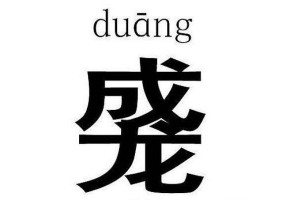
Since Duang didn’t have a character associated with it in Chinese, netizens came up with this: It’s a combination of Jackie Chan’s name in Chinese + Duang written on top. ^^
Later on, out of nowhere, a netizen remixed this advertisement with the music of 庞麦郎 Pang Mai Lang’s “My sneaker” “我的滑板鞋” (wǒ de huá bǎn xié) – a spoof music that is unreasonably hot in China right now. In it, you hear “Duang” repeated over and over with a bunch of special effects. It’s really quite something. So let’s get duangggggg now!
门“duang”的一下就开了。
mén duāng de yī xià jiù kāi le.
Tada(duang)! The door is open.
Chinese slang #2: Tired like a dog
累成狗
leì chéng gǒu
tired like a dog
Nowadays in China, a lot of sayings are used to express how tired or bored we feel, but the most popular slang expression is this one: “累成狗” (leì chéng gǒu, tired like a dog).
This Chinese catchword works more or less like an adjective, and means “like a dog” (Adjective + 成狗). So you can add anything you want in the front, like 饿成狗 “hungry like a dog”; 热成狗 “hot like a dog”; 穷成狗 “poor like a dog”, anything you want. This slang expression works just like 热死了rè sǐ le “I am hot to death”. Both 成狗 and 死了 are used here after the adjective to add emphasis.
You might be wondering why a dog? I didn’t find the answer as to how this all started, but just picture a tired little puppy face with its little tongue hanging out of its mouth, lying on the ground. I think it perfectly sums up our feeling.
昨天作业超级难,我累成狗了!
zuó tiān zuò yè chāo jí duō, wǒ lèi chéng gǒu le!
Yesterday’s homework was super hard, I was tired like a dog!
Chinese catchphrase #3: Moe-moe cutie
萌萌哒
méng méng da
cutie-pie
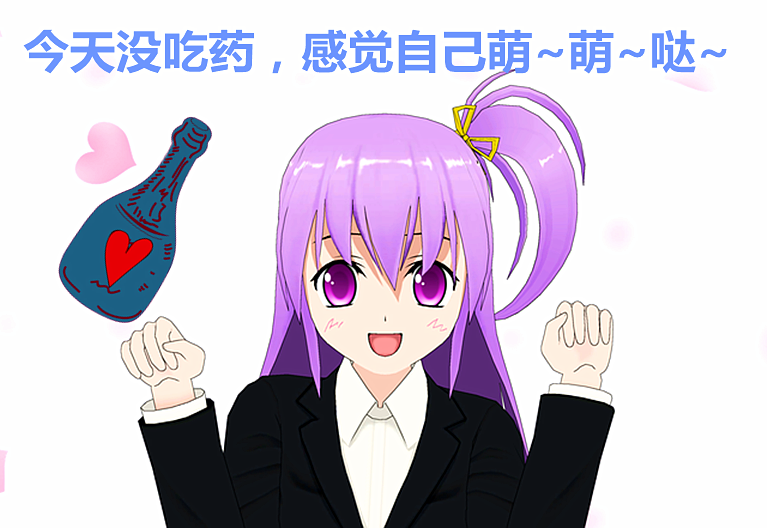
I feel so cute ~~ – picture credit: Duitang
萌萌哒 is an expression influenced by the Japanese Manga.
“萌” (méng) literally means “cute”, and “哒” (da) is a modal particle. The Chinese like to use a word twice to add emphasis to it, such as:
好好吃 hǎohǎochī. It taste good
好好玩 hǎohǎowán. It’s funny.
That’s why here “萌萌” actually means the same as “萌”. It is generally used to describe someone who is especially cute and lovely. This expression originated on 豆瓣 Douban, a very popular social website used by Chinese teenagers, where people can exchange their thoughts about the books they read, movies, music, events, blogs and other contents. On Douban, one day a netizen posted “Today I forgot to take my medicine and I feel so cute.”
今天出来没吃药<( ̄▽ ̄)>感觉整个人都萌萌哒p(# ̄▽ ̄#)o
jīn tiān chū lái méi chī yào, gǎn jué zhěng gè rén dōu méng méng da
Today I forgot to take my medicine and I feel so cute.
You can use this word to express someone is really cute or sometimes you can use it to make fun of yourself. Just for fun~.
剪了新发型,感觉自己萌萌哒。
jiǎn le xīn fà xíng, gǎn jué zì jǐ méng méng da
Got my new haircut, I feel so cute. (here, it has a positive meaning)
Chinese slang#4: 么么哒 mua~
么么哒
momoda
kiss kiss
么么哒 shares the same pattern as 萌萌哒 (words reduplication) and is now used by teenagers and also adults in China to express one’s love and affection when they text a message or chat online. It is not only used between lovers but also with family and friends. It is a cute mimetic word of a kissing sound, just like mua~ Teenagers always use this symbol as a kiss too: >3333333
一会儿见亲爱的,么么哒~
Yi hui er jian qin ai de, momoda~
See you later darling, kiss you~
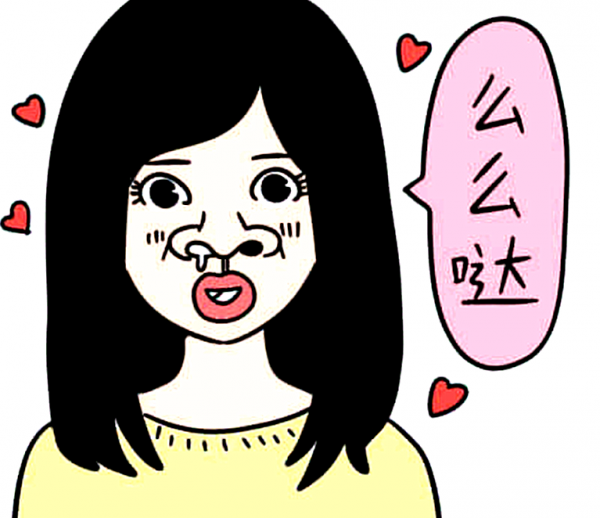
Maybe you’ll shocked by this photo, an ugly girl with a running nose, seriously? Haha, the Chinese now like this mock-picture, this face is very popular on the internet. Send a kiss to your lovers like this? So funny!
Chinese catchphrase #5: Rich and bitch
有钱就是任性
yǒu qián jiù shì rèn xìng
have money, can act however I want
有钱就是任性 is a saying that says “you’re rich so you can do whatever you want and bitch as much as you want”.
This slang expression originates from a real event: One day in April 2014, Mr. Liu spent 1760 yuan online to buy a health care product. Soon after, he got a strange call persuading him to buy other drugs for the first product to be effective. In the following four months, Mr. Liu sent about 540,000 yuan to the fraud scheme. He said that he’d figured out after dishing out 70 000 RMB that it was a scam but kept going. “I just wanted to see how much could they take from me!”, said Mr. Liu. Everyone was amazed by his words and absurb rich-guy behavior. He must be really rich, huh? So that’s how the expression 有钱就是任性 became popular.
Next time you want to show off your wealth, but not exactly in Mr Liu’s way, you can say:
我从来不住五星级以下的宾馆,有钱就是任性。
wǒ cóng lái bú zhù wǔ xīng jí yǐ xià de bīn guǎn, yǒu qiín jiù shì rèn xìng.
I never go to hotels that are less than five-stars, I’m just so rich.
Chinese Internet slang #6: Crazy or Drunk?
也是醉了!
yě shì zuì le
Are you kidding me? Have I become crazy?
The literal meaning of this expression is: being drunk. But now, it is used in Chinese to show how helpless one feels, and in situations where one has nothing to say or doesn’t understand. The slang meaning is therefore closer to “Are you kidding me?!” or “Have I become crazy?!”
看那个姑娘的打扮,我也是醉了。
kàn nà ge gū niang de dǎ bàn, wǒ yě shì zuì le.
Look at that girl’s way of dressing, have I become crazy?
这么多作业我也是醉了。
zhè me duō zuò yè wǒ yě shì zuì le.
Are you kidding me?! We have that much homework?
Chinese catchphrase #7: You can you up
你行你上
nǐ xíng nǐ shàng
If you can do it, do it.
你行你上 literally means “you can you up”. As a slang expression, it means “if you can, do it , go ahead, if not please shut up.” It’s especially used about people who like to criticize others, especially when the person who’s doing the criticizing is not capable of doing the same thing as you.
A: 我觉得他做的不够好。
wǒ jué de tā zuò de bú gòu hǎo.
I don’t think he did good enough.
B: 你行你上啊。
Nǐ xíng nǐ shàng a.
If you think you can do it, just do it.
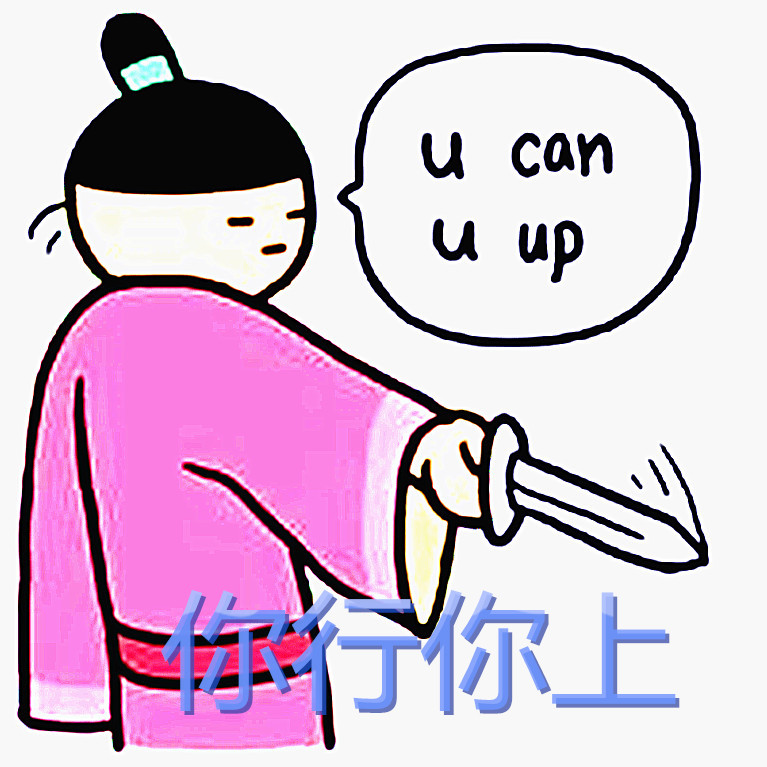
Chinese buzzword #8: No zuo no die
不作不死
bù zuō bù sǐ
Don’t do silly things, don’t die
作 “zuō” in Chinese means to “act silly or daring”. This saying means that if you don’t do something silly, you won’t end up with bad consequences.
Look at this conversation and you’ll understand:
A: 我考试作弊被当面抓住,现在我的成绩被取消了…
wǒ kǎo shì zuò bì bèi dāng miàn zhuā zhù, xiàn zài wǒ de chéng jī bèi qǔ xiāo le.
I cheated on the exam yesterday, and I was caught in the act, now my grades have been canceled….
B: 不作不死啊。
bù zuō bù sǐ a.
If you hadn’t been silly, you wouldn’t have gotten into such trouble.

KEEP CALM AND NO ZUO NO DIE – picture credit: keepcalm-o-matic.co.uk
Chinese catchphrase #9 Goddesses and She-males
女神和女汉子
nǚ shén hé nǚ hàn zi
Goddesses and masculine women
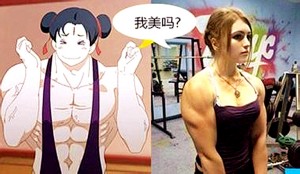
我美吗? Am I beautiful? These two muscular fine ladies ask.
Needless to say, we all know what a goddess is, like Audrey Hepburn, so beautiful and elegant that everyone admires her. In Chinese, we call a woman who is incredibly beautiful and shinning a goddess 女神nǚ shén.
On the other side, what’s the opposite of a goddess? There is another group of girls that exist in our daily life; they act carelessly and sloppily, they always have a generous personality and are forthright by nature. Some are even more manly then men. In that case, these men-like women in Chinese are called 女汉子(nǚ hàn zi), masculine women or manly girls. Here 汉子 hànzi means man; it is the formal way to say 男人 (nán rén) ‘man’. 女汉子usually carries a positive meaning and is used to describe an independent girl who is not afraid of hardships.
她可以自己修理家里的一切电器,真是个女汉子。
Tā kěyǐ zìjǐ xiūlǐ jiālǐ de yīqiè diànqì, zhēnshì gè nǚ hànzi.
She can fix all the household electrical appliances herself, she is really a manly girl.
Mandarin slang #10: Have yourself a loneliness party
寂寞党
jì mò dǎng
寂寞党 is a popular saying that started when one day, a netizen posted a photo of him eating noodles, with the accompanying sentence: “哥吃的不是面,是寂寞”(gē chī de bú shì miàn shì jì mò) which means “What I am eating is not noodles, it’s loneliness.” Since then, this kind of saying has been very fashionable. Everyone think it’s funny, cool and even a little ironic. Actually, this expression doesn’t have a special meaning. Here 党 means a group of person. 寂寞jìmò means loneliness. You can use this expression when you feel lonely or bad or just for fun.
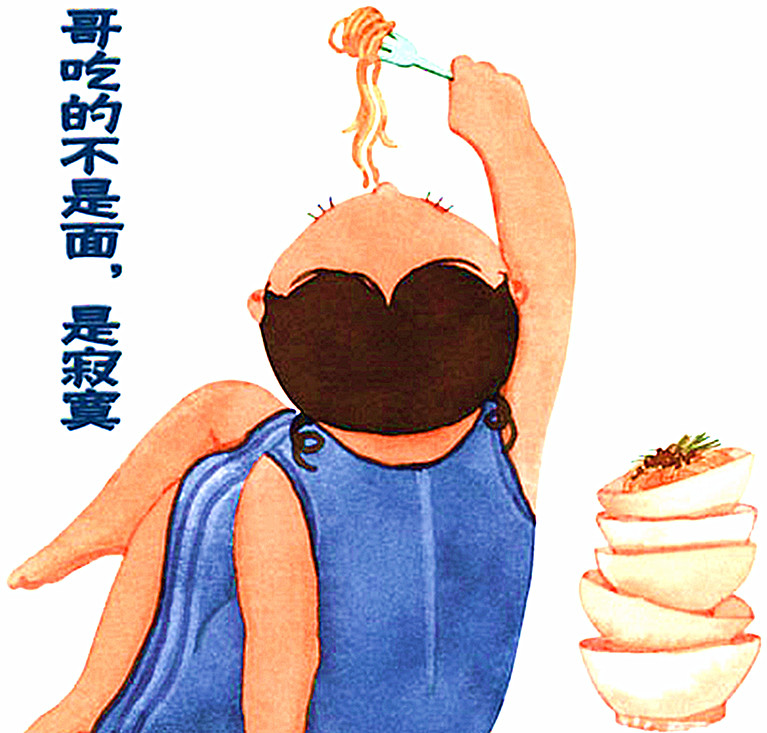
我抽的不是烟,是寂寞。
wǒ chōu de bú shì yān, shì jì mò.
What I’m smoking is not the cigarette, it’s loneliness.
All right, there you have it: 10 funny catchwords that are really popular now in China. So next time when you see some strange expressions in forums or chat with your Chinese friends, you won’t be shocked and you can use them whenever you want. Want to be cooler and fashionable in Chinese, just use these catchwords Nincha just taught you! Just remember to not be fooled by their literal meaning; sometimes they mean nothing and are used just for fun, you know, it’s a “duang” thing! So now you know, the Chinese are really creative with their language and everything is possible!
么么哒!
Yanjie and
The Nincha Team
Stay in touch with us on Facebook, Twitter, Instagram, and Pinterest.
Try the best way to learn Chinese today.
Ninchanese is free to use!
Sign up now





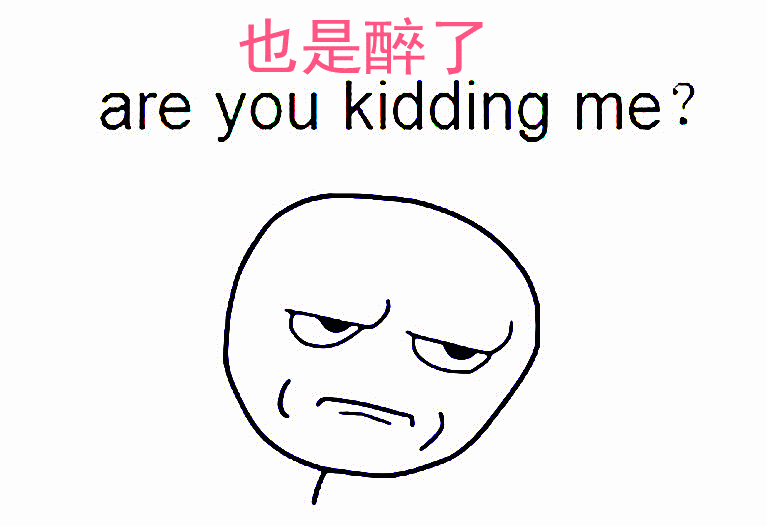
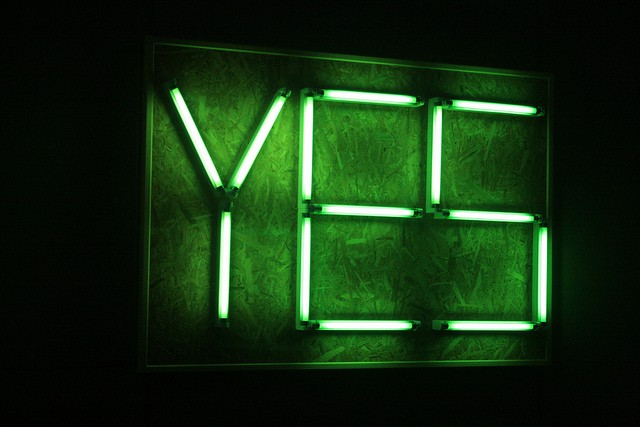
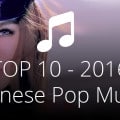


15 comments
Join the conversationKagKa - September 6, 2016
What does CP means?
The Nincha Team - September 6, 2016
Hi KagKa, where did you see CP in the article? Can’t seem to find it!
wbloodc - January 6, 2017
CP is short for ‘couple’
Pingback: How to Learn Mandarin Overseas – Online Travel Insurance
Random - September 27, 2016
CP is used mostly by taiwanese.Cost-performance (CP) ratio to indicate the value of an item.
Nicole Li - December 6, 2017
Should put 555555 as well. it is short for crying.
ji__ ssi - February 25, 2018
What does EXM means? Help me.
ethan wright - September 12, 2018
it means yHello: Nǐhǎo (Nee how)
Thank you: Xièxiè (Shieh-shieh)
You’re welcome: Bù kèqì (Boo kuh-chi)
Good morning: Zǎo (Zhow)
Goodnight: Wǎn’ān (One-un)
My name is…: Wǒ jiào… ( …
My friend’s name is…: Wǒ de péngyǒu jiào… …
Where is the bathroom: Xǐshǒujiān zài nǎlǐ?
Thank you: Xièxiè (Shieh-shieh)
And if there’s a second word to know, this would be it. Always be a polite tourist.
You’re welcome: Bù kèqì (Boo kuh-chi)
Respond with this if someone says “xièxiè (shieh-shieh)” to you.
Good morning: Zǎo (Zhow)
Instead of saying both hello (nǐhǎo) and good morning, you can greet someone with just zǎo in the morning.
Goodnight: Wǎn’ān (One-un)
This is typically used when you’re actually going to bed.
My name is…: Wǒ jiào… (Wuh jeow…)
Where is the bathroom: Xǐshǒujiān zài nǎlǐ? (See-sow-jian zai na-lee?)
This literally translates to “Where is the hand-washing room?” so you can Make it cheaper: Piányí yī diǎn. (Pian-yee yee dian.)
Combine this phrase with the one above and you’re well on your way to becoming a fluent haggler in Chinese.
Very beautiful: Hĕn piàoliang (Hen peow-liung)
Locals love when you compliment their home country, so feel free to stoke their egos a bit with this phrase. For example, you might tell your cab driver on the Bund, “Shanghai hen piaoliang” or remark to your tour guide, “Guilin hen piaoliang,” while admiring the karst mountains. If trying to impress a lady you can tell her, “Nǐ hěn piàoliang (nee hen peow liung).” We make no promises about the outcome.
Delicious: Hào chī (How chir); Very delicious: Hěn hào chī (Hen how chir)
mimic the motion of washing your hands to help your chances of being understood. You will see 男 on the door for the men’s bathroom and 女 on the door of the women’s.
How much?: Duō shǎo? (Dwuh shauw?)
Use this phrase to ask the price of something at a street market in China, Taiwan, or Singapore.
Too expensive: Tài guìle! (Tie gway luhCheck, please: Măi dān (My dahn)
Try saying this at the end of your meal.
I don’t understand: Wǒ bù dǒng (Wuh boo dong)
A good phrase to remember as you will likely need it.
Let’s go!: Wǒmen zǒu ba! (Wuh-men zoew bah!)
You can use this to signify you’re ready to leave or to prompt your companions to get going.
Mandarin”, originally comes from the word for an official government worker of the Chinese empire.
yī shì wú chéng
to get nowhere / to be a total failure / to have achieved nothing
yī yán wéi dìng
one word and it’s settled (idiom); It’s a deal!
mǒ yī bí zi huī
to suffer a snub / literally, to rub one’s nose with dust
tán zhǐ yī huī jiān
in a flash (idiom)
yī qì
at one go / at a stretch / for a period of time
yī jiā
group / the same family / the whole family yī jiǎ zǐ
sixty years
yī diǎn yī dī
bit by bit / every little bit
1. 加油!Jiāyóu!
Literally: “Add oil!”
Function: Used to encourage someone to make extra effort, to do better or to cheer someone on.
Near-equivalent in English: “You can do it!” or “Go John/Mary/etc.!” depending on context.
2. 我肚子饿了。Wǒ dùzi è le.
Literally: “My belly is hungry.”
Function: Used to let the other person know you are hungry.
Near-equivalent in English: “I’m hungry.” or “I’m starving.”
3. 你早点休息。Nǐ zǎo diǎn xiūxi.
Literally: “You [better] rest early.”
Function: Used to show concern for someone late at night, to urge them to go to bed early.
Near-equivalent in English: “You better get to bed early” or “Don’t have a late one.”
4. 原来如此。Yuánlái rúcǐ.
Literally: “It was like this all along.”
Function: Used to indicate that you have just realised something to be true.
Near-equivalent in English: “I see.” or “Now I got you.”
5. 算了吧。Suàn le ba.
Literally: 算 (“count; regard”) + 了 (verb completion particle) + 吧 (particle indicating suggestion)
Function: Used to let the other person know that you don’t care anymore about what was being talked about.
Near-equivalent in English: “Forget about it.” or “Nevermind.”
6. 怎么办呢?Zěnme bàn ne?
Literally: “How to do?”
Function: Used to express frustration at not knowing what to do in a certain situation.
Near-equivalent in English: “What do I do?” or “What should I do?”
Synonyms: 这如何是好?
7. 真是的。Zhēn shì de.
Literally: 真 (“really”) + 是 (“is”) + 的 (grammatical particle, used for emphasis)
Function: Used to express displeasure or annoyance at the actions of someone else.
Near-equivalent in English: “Oh come on!”, “Seriously!” or “Jesus!” depending on context.
8. 不会吧。Bù huì ba.
Literally: “Can’t be.”
Function: Used to express a feeling that the likelihood of something happening is very low.
Near-equivalent in English: “No way.”, “I doubt it.” or “You’re kidding me.” depending on context.
9. 改天再说吧。Gǎitiān zàishuō ba.
Literally: “Change day, speak again.”
Function: Used when you wish to cancel a plan with someone, and reschedule it for another day.
Near-equivalent in English: “Let’s try for another day.” or “Let’s take a rain check.”
10. 不用急。Bù yòng jí.
Literally: “Don’t use urgent.” (“No use for urgency.”)
Function: Used to reassure someone that what is being discussed is not urgent.
Near-equivalent in English: “No rush.” or “Take your time.”
Synonyms: 不急。
11. 真的假的?Zhēn de jiǎ de?
Literally: “Real, fake?”
Function: Used to express surprise or doubt about something just discussed or discovered.
Near-equivalent in English: “Really?” or “No way!”
12. 你真棒!Nǐ zhēn bàng!
Literally: “You’re really excellent!”
Function: Used to praise someone for their talent, behaviour or actions.
Near-equivalent in English: “You’re awesome” or “You’re really something.”
Synonyms: 你真行;你可以的。
13. 我想了解一下。 Wǒ xiǎng liǎojiě yīxià.
Literally: “I want to understand/know.”
Function: Used to politely enquire about something.
Near-equivalent phrase in English: “I was just wondering…” or “I’d like to know more about…”
14. 有事可以找我。Yǒu shì kěyǐ zhǎo wǒ.
Literally: “[If] you have a matter you can try to find me.”
Function: Used to express your willingness to help someone.
Near-equivalent phrase in English: “Contact me if you need any help.”
Intermediate Level
15. 不带这样的。Bù dài zhèyàng de.
Literally: “Not look after like this.”
Function: Used to state that the way someone is treating you is unacceptable or unfair.
Near-equivalent phrase in English: “How could you do this to me?”, “Oh, come on!” or “That’s not cool.”
16. 我也说不好。Wǒ yě shuō bù hǎo.
Literally: 我 (“I”) + 也 (“also”) + 说 (“speak”) + 不好 (“not good”)
Function: Used to state that you cannot make a comment about a topic or situation as you are not very certain about it.
Near-equivalent in English: “I’m not sure about that.”
Synonym: 很难说。
17. 那怎么行啊?Nà zěnme xíng a?
Literally: “How is that OK?”
Function: Used to state that a situation is not acceptable.
Near-equivalent in English: “That won’t do” or “How could that work?”
18. 我赶时间。Wǒ gǎn shíjiān.
Literally: “I’m rushing for time.”
Function: Used to indicate that you are in a hurry.
Near-equivalent in English: “I’m in a hurry” or “I’m in a rush”.
19. 但愿吧。Dànyuàn ba.
Literally: 但愿 (“to wish”) + 吧 (particle indicating suggestion)
Function: Used to indicate that you wish what someone has just said turns out to be the case.
Near-equivalent in English: “I hope so.”
Synonyms: 希望如此。
20. 那倒是。Nà dào shì.
Literally: “That actually is.”
Function: Used to acknowledge that what someone has just said is in fact the case.
Near-equivalent in English: “That’s right” or “This is true”.
21. 谁说的?Shéi shuō de?
Literally: “Who said?”
Function: Used to indicate that you doubt what someone has just said is true.
Near-equivalent in English: “Yeah, right…!” or “On what planet?”
22. 这事已经过去了。Zhè shì yǐjīng guòqu le.
Literally: “This matter has already passed.”
Function: Used to advise someone that what has happened belongs to the past and so should no longer be a concern anymore.
Near-equivalent in English: “That’s in the past now.”, “That’s a thing of the past.” or “It’s all over now.”
23. 她有了。Tā yǒu le.
Literally: “She has.”
Function: Used to state that a woman is pregnant. Used as a euphemism.
Near-equivalent in English: “She’s got a bun in the oven.” or “She’s expecting.”
24. [某人]真有两下子。[Somebody] zhēn yǒu liǎngxiàzi.
Literally: “Somebody really has a couple of times.”
Function: Used to state that someone is skillful, with a high level of ability.
Near-equivalent in English: “Somebody has real skill.” or “S/he really knows her/his stuff.”
25. 真是个悲剧哦。Zhēn shì ge bēijù o.
Literally: “Really is a tragedy.”
Function: Used to complain about something which disappointed you. Has a melodramatic tone. The word 悲剧 is often typed as the pun 杯具 (“cup”). By extension, the word 茶几 (“tea table”) is also used to describe someone you think leads a particularly sucky life.
Near-equivalent in English: “That really sucks.”, “What a bummer.” or “Fail.” (American slang)
Synonyms: 好悲剧哦。
26. 别激动。 Bié jīdòng.
Literally: “Don’t get agitated/excited.”
Function: Used to tell someone to calm down.
Near-equivalent phrase in English: “Calm down.” or “Settle down.”
27. 数[某人]最小了。Shǔ [somebody] zuì xiǎo le.
Literally: “Count somebody as the littlest.”
Function: Used to state that someone is the youngest in their family, or in a group of people.
Near-equivalent in English: “Somebody is the youngest here.” or “Somebody is the baby of the family.”
28. 这事明摆着的呀。Zhè shì míngbǎi zhe de ya.
Literally: “This matter is obvious.”
Function: Used to state that something is obvious so does not need further explanation.
Near-equivalent in English: “It’s obvious
Eric - January 27, 2020
Excuse me
ethan wright - September 12, 2018
hi guys
Medformis.Com - March 9, 2020
There you have it! 10 popular Chinese slang words that will surely make you sound like a native. Don’t worry if you don’t think you are using them correctly at first. You can practice these in conversation (real or virtual) with your Chinese friends, who can help you understand the right context to use them. You’ll be a god-level Chinese slang speaker in no time!
APKun - April 22, 2020
If you bump into a tough character on the street or insult somebody, they might say ????, or your skin looks itchy. This expression is used when expressing a desire to beat someone up.
Worries - April 22, 2020
What a damper. ???, meaning drop soup chicken, or a chicken who falls into soup is used to describe somebody who trips and falls into water or gets caught in the rain.
Daysis - April 23, 2020
Do you have any favorite Chinese slang words that we missed? Are there any other slang words you would like to know how to say? Let us know in the comments!
Lady - April 24, 2020
A very common and lowkey hilarious insult in Mandarin is ?? or stupid egg. Depending on the situation, this can either be a playful insult when a friend does something dumb or straight up fightin words if said to a stranger.
Comments are closed.